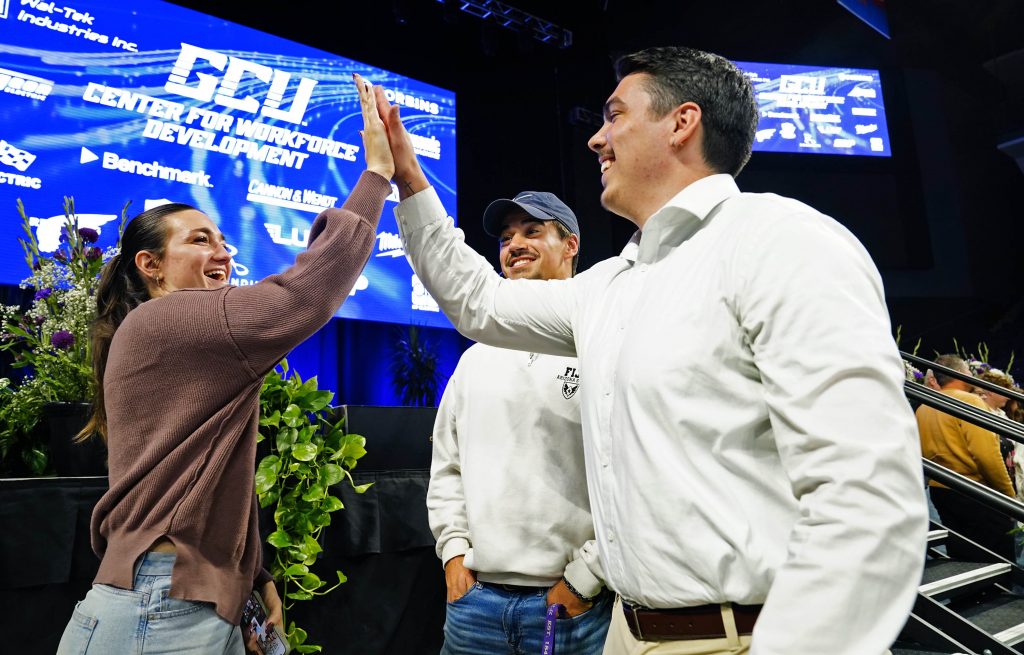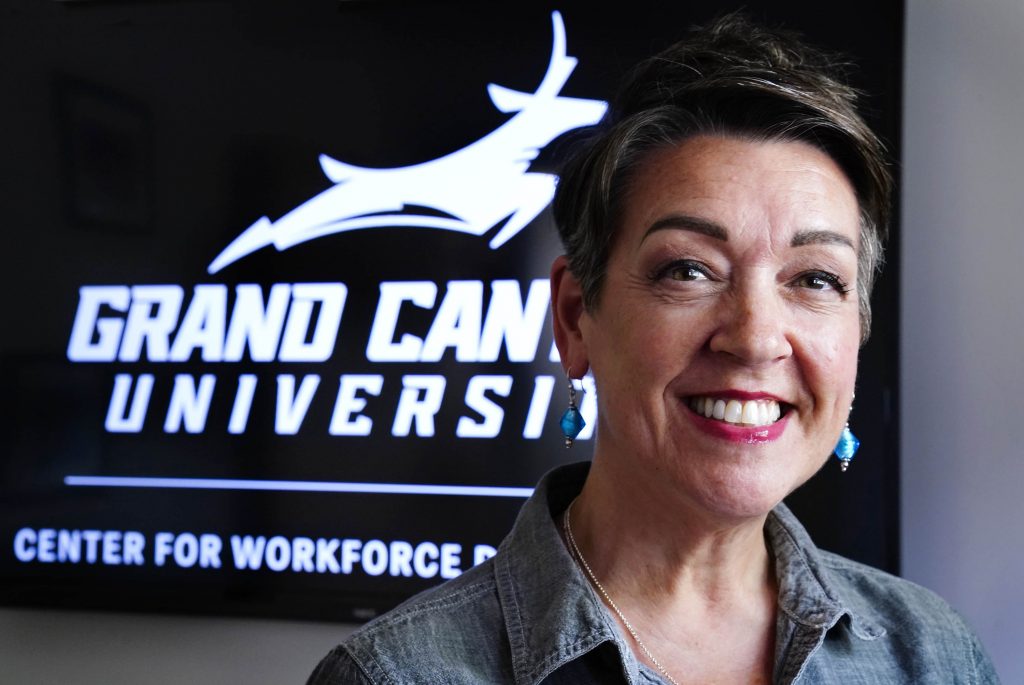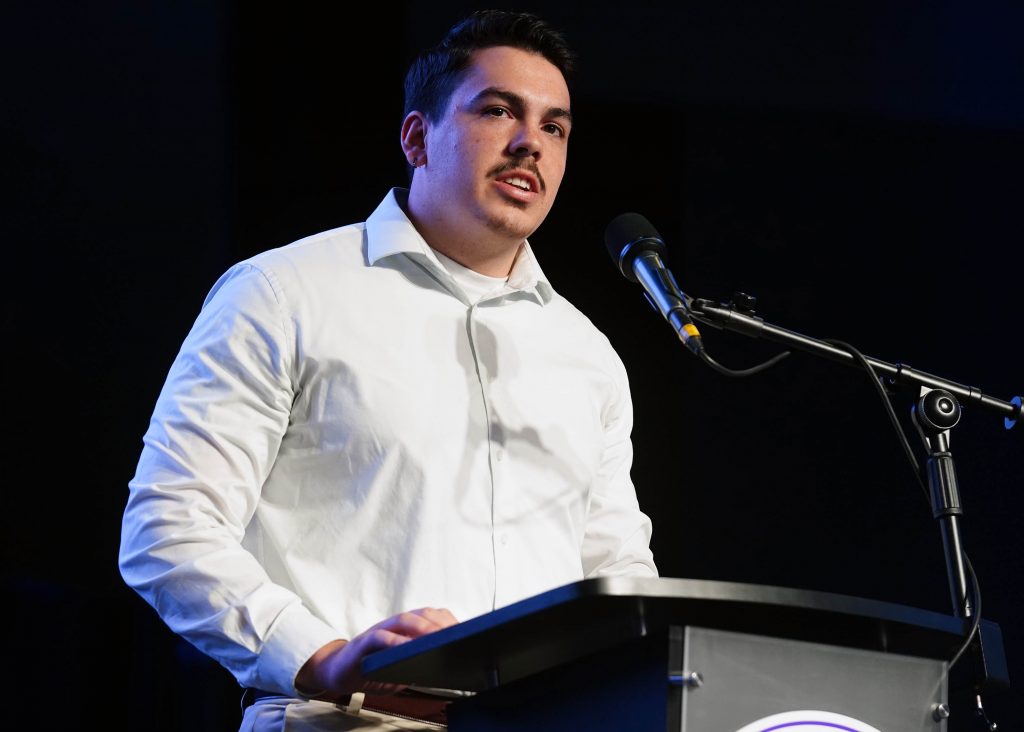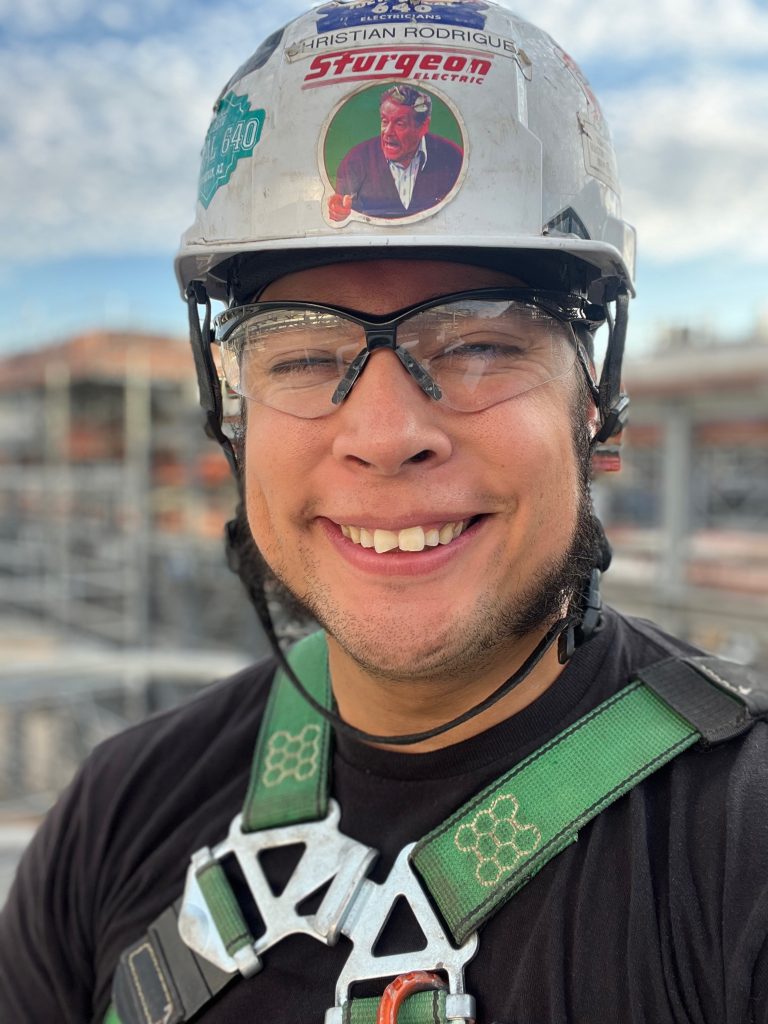
Photos by Ralph Freso
EDITOR'S NOTE: This story originally appeared in the February issue of GCU Magazine, available in the purple bins across campus or digitally.
Jenelle Davis was typical among 150 participants who walked across the university stage in December to accept a certificate of completion to loved ones’ whoops and hollers.
They didn’t think four years of college study suited them. Or, like Davis, decided “I don’t have the money.”
Davis now makes money.
After completing Grand Canyon University Center for Workforce Development’s Pre-Apprenticeship for Electricians Pathway, she quickly landed a job as an apprentice with DP Electric.
The locksmith father who she helped growing up saw it coming, despite her initial goal to get a four-year degree. She liked to work with her hands and bust into male-dominated territory.
“I do wrestling and jujitsu, so part of it is proving people wrong,” she said. “They think I can’t do it. I will do it.”
The celebration at the end of the semester at Global Credit Union Arena is a dress-up or dress-down affair – your choice – by people from all walks of life whose families shed plenty of tears after loved ones complete the four-course, one-semester pathway. In five cohorts since the center launched in 2022 and expanded a year later to include a Computer Numerical Control (CNC) Pathway, 333 people have completed all required courses.

“A lot of these people never thought they would come to college,” said Shelly Seitz, the center’s director. Now, she added, they are on the other side of it in an apprenticeship, making money and have “opportunities in front of them they didn’t know they would ever have.”
“Some of the students already had children, and they said, ‘I need to buy things for my kids and support my family and feel good about it and not be stressed out.’ Their lives have improved financially so much.”
The number of participants has tripled since its start, and the industry sponsors of the pathways has grown.
But the Center for Workforce Development is far from done growing. In the fall, it expanded to Austin, Texas, where six participants completed the electricians’ pathway.
In the coming months, a Manufacturing Specialist Pathway will bring in another 45 participants. The center is partnering with Taiwan Semiconductor Manufacturing Co., which is building a massive plant in north Phoenix.
And a Construction Trades General Pathway was recently launched with McCarthy Building Companies, another effort that will help solve a workforce shortage in the trades.

College of Engineering and Technology Dean Paul Lambertson, whose college oversees the center, said he doesn’t see trades as taking away from higher education but adding to it.
“A couple decades ago or more, the country made a decision: Everybody had to go to college, or you weren’t good. That is dumber than dirt,” he said. “At GCU, we are about helping people find your purpose. We have a lot of demand for trades in this country, and we have a lot of talent that needs to be molded into something a trade can do.
“That’s us. We are the match made in heaven. Come to us, we will mold you to the trade ... And guess what? You went to college. Because you are a college student when you are here.”
The center was launched after Rosendin Electric’s Mike Greenawalt came to GCU with a dilemma. More than half of the apprentices in his company’s program were dropping out. There had to be a way to vet them and prepare them for the demanding work.
GCU stepped in with a curriculum of courses in math and English and courses to help them learn the foundations of a trade. All are on campus with instructors and leaders who have endeared themselves to the participants.
“We genuinely care for the students, and it’s clear they know we do. Our director is known as ‘Mama Shelly.’ (Program Manager) Mickey Nuñez inspires people; he’s with the students all the time,” Lambertson said. “And we listen to industry. We aren’t going to do this our way, we are going to do it your way.”

Many students either come directly from high school or have taken a detour through service industry jobs and are looking for something better. They learn they have to show up, show up on time, often before sunrise, and be ready to work.
“Our first cohort of 39 went into that rack and stack of 800 (union apprenticeship applicants) and came out ranked one through 39,” Lambertson said. “You can’t get a cleaner sweep than that.”
Sponsors soon noticed the pathway led to success. According to Corbins Electric, the turnover rate among its apprentices has dropped by 20 percentage points since it has hired 124 of the pathway participants.
“It gives students and young people (an idea of) what the trades are about prior to jumping right in and being overwhelmed by the industry,” said Matt Apodaca, Corbins’ director of training and workforce development. “It’s physically and mentally demanding. You are waking up at 5 in the morning and working 10-hour days and on Saturday. It takes its toll on people, compared to a few hours at McDonald’s.
“But I think it opens their eyes up to the potential for success and a career, going a route they didn’t know exists. A lot of people have been successful with us after they come through GCU who wouldn’t be doing it as quickly in another industry.”
After working and attending apprenticeship classes, they can “turn out” as journeyman and start at $75,000 a year at Corbins, he said, with the chance to increase wages rapidly.

It’s already changing the family of Christian Rodriguez, 29. He moved from Nogales, Arizona, to Phoenix to join the first cohort in the fall of 2022. He’s in his second year with the International Brotherhood of Electrical Workers union and is contracted to Sturgeon Electric.
He makes enough to pay for his apartment, put food on the table and even send money to his extended family in Nogales. He’s also found a calling.
“What I love about electrical work is the way the systems work, the way electricity runs through the equipment, the way math applies,” he said. “When you are bending conduit, you can see trigonometry come to life.”
Davis said GCU’s pathway helped in everything, from writing professional emails to wiring circuits.
“I got really excited when we did labs and really put our hands into it,” she said. “When we went on onsite visits, I was wiring up plugs.”
In the CNC Pathway, participants work with sophisticated equipment at Lux Precision Manufacturing, where founder and GCU alumnus Weston Smith has launched a company at the university’s 27th Avenue complex making precision parts for the medical, semiconductor and aerospace industries.
Once they go through the pathway at GCU, Seitz said they are looked at differently by new employers. “They have more responsibility than an apprentice normally would because they have incredible leadership skills.”
More is on the horizon for a program that recently won a Greater Phoenix Chamber award for top economic driver. Construction trades can be refined for companies that need specialties in plumbing or cement work, for example. It’s all part of listening to industry and giving them what they need, Lambertson said, and championing all variety of learners.
“I look at knowledge delivery the way a businessman does. You have to meet people where they are. For some people, that’s a four-course, one-semester trades pathway. For others, it’s a cybersecurity certificate and others a bachelor’s or master’s degree. We have to be able to do that across all the different modalities,” Lambertson said.
“And we want to do that with Christ-centered character-building and entrepreneurial-minded teaching. That is a success path right there that has been tried and has been truth for a millennium. Who are we to do something different?”
Grand Canyon University senior writer Mike Kilen can be reached at [email protected]
***
Related content:
GCU News: GCU's workforce center honored for its economic impact
GCU News: GCU's trades pathway launches Texas site



































































